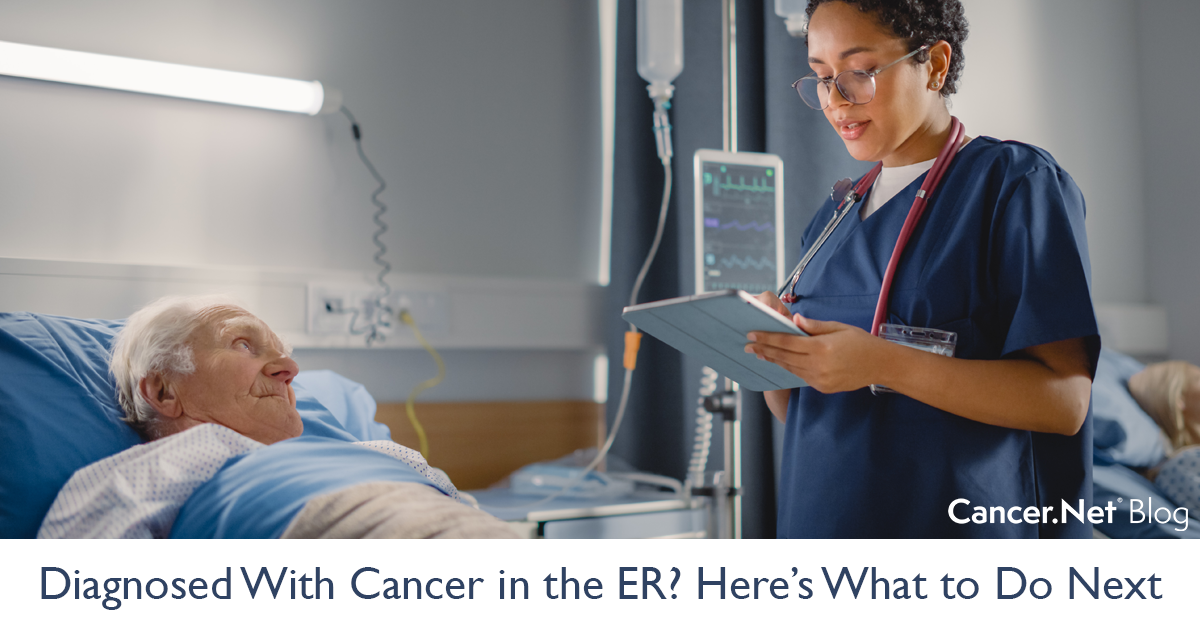
Alyssa Berns, DO, is a physician trained in both emergency medicine and critical care. She is an assistant residency program director for the emergency medicine residency at Hackensack University Medical Center in Hackensack, New Jersey. Dr. Berns is also a professor at the Hackensack Meridian School of Medicine. She works clinically with patients of all types in a hospital with a large cancer center and spends much of her nonclinical time teaching students and junior physicians. You can follow Dr. Berns on Twitter.
Often, when a cancer first begins to form, it does not cause any symptoms. Sometimes, it is diagnosed during this early stage with cancer screening tests that primary care doctors and specialists routinely perform, such as a colonoscopy or a mammogram. While cancer screening tests are not typically performed in the emergency department, sometimes cancer is still diagnosed there.
If you have been diagnosed with cancer in the emergency room (ER), it is important to take the necessary steps to receive cancer care after leaving the emergency department. Here’s what you should know about being diagnosed with cancer in the ER and what to do next.
What happens when someone receives a cancer diagnosis in the ER?
You may have come to the emergency department for symptoms caused by a cancer you did not know you had, which is then identified during your ER visit. These symptoms could include pain, trouble breathing, fatigue, or other new symptoms. Cancers can also be found in the ER incidentally, meaning that you came to the ER for another problem and a test you had revealed cancer or something suspicious that needs to be further studied to see whether it is cancer. An example of this is having a computed tomography (CT) scan done to check for an intestinal infection and finding out on the test that there are abnormal areas in 1 or more organs that may be cancerous.
Sometimes, it is clear from tests performed in the ER that you have cancer, and it is clear where the cancer started. Other times, testing can show signs that you have cancer, but it may not be clear where the cancer started. Or, the tests you received suggest cancer might be possible but it is not certain that cancer is present. In these cases, you will need more testing to find out if it is truly cancer or if there is another cause of the problem.
In the ER, there are certain tests that are very easy to get. These types of tests are used to diagnose and treat illness and injuries that need immediate treatment. While cancer is an extremely serious diagnosis, the tests used to diagnose it and find out how far it has progressed are not always available in the emergency department. Because of this, it is often necessary to have tests done after an appointment with an oncologist, or cancer specialist, who can review the results with you.
If you are very sick from the cancer or from another problem, the team caring for you in the ER will make sure you are admitted to the hospital and possibly arrange for you to meet with a cancer specialist while you are there. If you are well enough to go home, the doctor caring for you will likely refer you to the appropriate specialist who will provide the appropriate follow-up care for you.
What are the next steps after being diagnosed with cancer in the ER?
As explained above, most of the tests to diagnose and evaluate cancer cannot be performed in the ER. Because of this, it is very important that you make an appointment with an oncologist after your visit to the emergency department. Your ER doctor or your primary care doctor may provide a referral to an oncologist.
After making an appointment with the recommended oncologist, the next step is to schedule an appointment with your primary care doctor. Your primary care doctor can review the results with you again and answer any questions that have come up since you’ve gotten home. They can also help make sure any specialist you go to has all of your health information. If you don’t have an appointment with a cancer specialist already, your primary care doctor can sometimes help you with this, too.
Leaving the hospital with a cancer diagnosis from a doctor you have never met before can leave you feeling overwhelmed or scared. Many people also worry about the costs of cancer care. If you do not have health insurance, ask about the hospital’s charity care program before you leave the ER. If you are unsure if your insurance will pay for your visit to the specialist, ask the ER doctor what type of specialist to see, so you can call your insurance company and find out who in your network will accept your insurance.
Questions to ask if you’ve been diagnosed with cancer in the ER
If you have been diagnosed with cancer in the ER and have not yet had an appointment with your oncologist, questions you can ask your ER doctor or primary care doctor in the meantime include:
-
What are the signs and symptoms that suggest I have cancer?
-
When should I go back to the emergency department?
-
How soon after I leave the ER should I see my primary care doctor or the oncologist?
-
What do I do if I cannot get an appointment within the next few weeks?
-
Do I need to stop taking any of my prescription medications?
-
Are there any over-the-counter medications I should avoid?
-
What social services are available to help me during this time?
The author has no relevant relationships to disclose.







